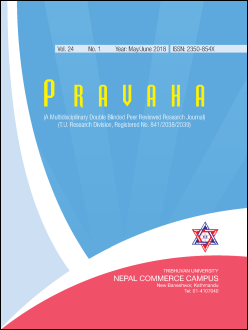Tax evasion in Nepal: An Inquiry
DOI:
https://doi.org/10.3126/pravaha.v24i1.20228Keywords:
Taxation, tax burden, tax reduction, tax evasion, economic growth.Abstract
Purpose: This article analyses the degree of relationship between tax evasion, total tax revenue and economic growth in Nepal.
Methodology: This empirical study adopts secondary data from various journals, books, reports, booklets, and the websites in order to obtain objective results between the research variables (i.e., tax evasion, total tax revenue and economic growth) applying both research tools of correlation and linear regression analysis.
Findings: The study found an inverse relationship between the variables (i.e., tax evasion and total tax revenue (-0.678) and tax evasion and economic growth (-0.666)) under correlation analysis. Similarly, it found negative influence of the tax evasion on total tax revenue and economic growth under the regression analysis. The examination of the influence of tax evasion on the total tax revenue showed that, other elements of the taxes kept constant, an increase in tax evasion by 1 unit led to a decrease in value of tax revenue by 34.037. In the same way, study of the influence of the tax evasion on the economic growth (at current price) showed that, other things being constant, an increase in tax evasion by 1 unit led to a decrease in the economic growth by the value of 147.440. Thus, tax evasion has an inverse relationship with economic growth, and tax revenue.
Originality: This paper provides an explicit new result on association and influence between and on the research variables (i.e., tax evasion between and on the total tax and economic growth) in Nepal for the duration of 9 years. Thus, this study furnishes the new knowledge in the literature of the research variables.
Pravaha
Vol. 24, No. 1, 2018, page: 83-95
Downloads
Downloads
Published
How to Cite
Issue
Section
License
© Nepal Commerce Campus, TU
Authors are required to transfer their copyright to the Nepal Commerce Campus, TU.




